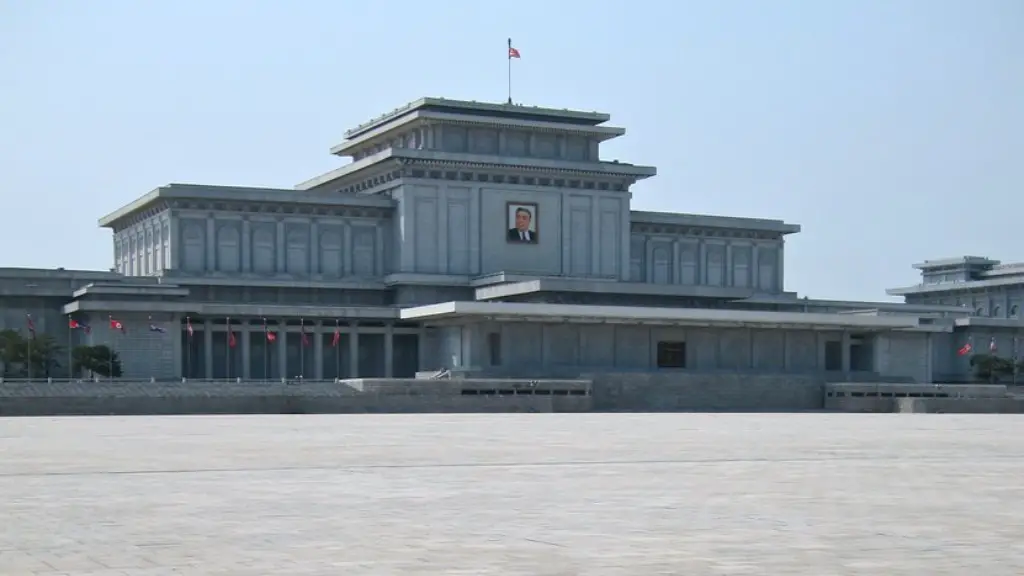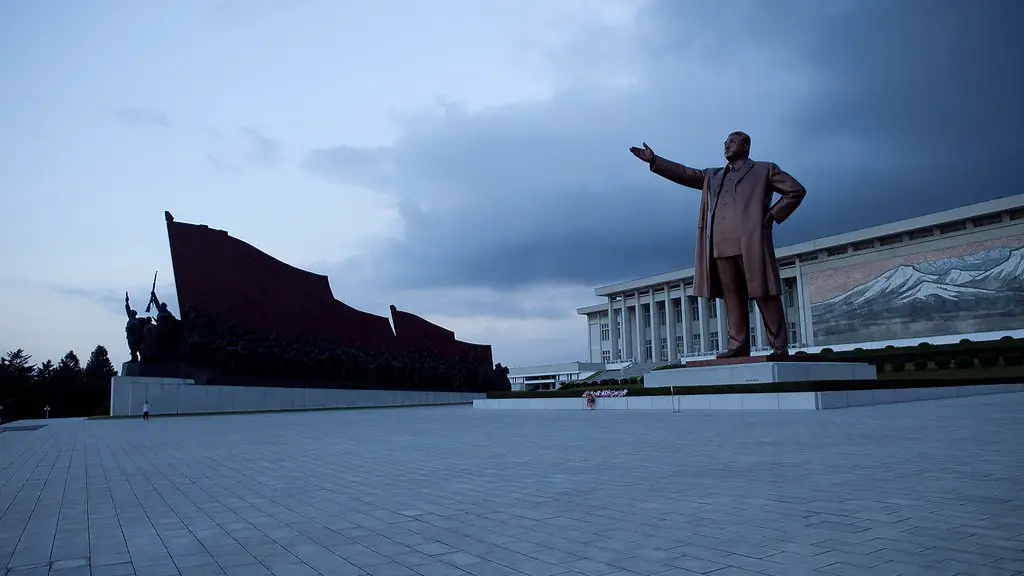Many political analysts have been asking the same question: will North Korea fall? In recent years the country has gained attention due to the actions of its leader, Kim Jong Un, and its persistent nuclear ambitions. While the government has made some advances in the past few years, such as entering into negotiations with South Korea and the United States, many believe that the nation is on a downward spiral. This article will examine the obstacles facing North Korea and explore the potential for its collapse.
North Korea is a heavyweight in the international community due to its nuclear capabilities and fierce determination in the face of threats and adversity. This can create the illusion of a strong nation but the country still faces some major obstacles. Chief among these is its constant state of poverty. North Korea’s economic prospects are dire and the nation lacks essential infrastructure and resources to enable economic growth.
The government’s refusal to open up the country to outsiders and its oppressive rule over its own citizens create an environment of fear and mistrust. The country’s’ isolation compounds the challenge of alleviating the economic crisis. International trade and commerce with other countries would provide much needed capital. Unfortunately, the government has consistently rejected requests from outside nations to open up for trade and investment.
In recent years, the international community has exerted pressure on North Korea by imposing severe economic sanctions. The country has some of the most stringent sanctions in the world, including restrictions on buying food and fuel. This has caused detrimental effects on the people as it can take a long time for the restrictions to have a visible effect. If the pressure continues, North Korea’s already fragile economy could be completely crippled and even lead to a full-scale collapse.
Experts have argued that the cause of North Korea’s downfall could be traced back to its leadership. Kim Jong Un has been in power since 2011 and has maintained a hardline approach to foreign policy. He has been unafraid to challenge other countries and issue threats in order to gain international attention. This can be seen by his nuclear weapons tests, which have further isolated the nation from the rest of the world.
While it’s difficult to predict the future of North Korea, many political analysts agree that the country is on a path towards collapse. The nation lacks resources and the oppressive rule of its government is unlikely to bring about much long-term change. Furthermore, the international community is unlikely to back down from sanctions, meaning that North Korea will continue to feel their cumulative effects.
The Impact of Sanctions
The past decade has seen North Korea suffer through heavy economic sanctions as a result of its nuclear ambitions and perceived defiance of the international community. These sanctions have cut the nation off from the global economy, making it difficult for North Koreans to access resources such as food and fuel. This has been an incredibly challenging period for the people of North Korea, as the sanctions have a visible and direct impact on their lives.
The harsh sanctions have stunted North Korea’s economic growth and are a major obstacle in the nation’s quest to build prosperity. Without access to global markets, North Korea is unable to buy goods at competitive prices. This means that the nation is missing out on much-needed capital that it could use to improve its infrastructure.
The impact of sanctions has been further exacerbated by the government’s refusal to cooperate with the international community. By not engaging in diplomatic negotiations and other forms of cooperation, Pyongyang has sealed its fate and has little hope of reversing the economic decline it is currently experiencing.
The ongoing economic crisis in North Korea could eventually lead to its downfall if the international community continues to exert pressure. While North Korea’s government is adept at posturing and making threats, it is often seen as relying on nuclear weapons and other aggressive strategies to stay in power. The continued isolation of the nation could lead to a tipping point and invite a collapse of the regime in the years to come.
North Korea’s Relationship with China
The relationship between North Korea and China has been strained in recent years due to Beijing’s support of United Nations sanctions against Pyongyang. China had long been North Korea’s biggest ally and trade partner and this shift in policy has put immense strain on the economic relationship between the two nations.
China’s support for sanctions has weakened North Korea’s ability to trade in the global economy and is another factor that could lead to its downfall. Without China’s support, North Korea is isolated and forced to trade only with nations that share its worldview. This limits North Korea’s potential to acquire resources and increase its GDP.
The relationship between North Korea and China is further complicated by the fact that there are many North Korean’s living in China. These people often flee to China in search of a better life, but China’s government has cracked down on their presence in the recent past. This has led to tension between the two countries and the breaking of the unofficial ceasefire that had prevailed for decades.
China’s relationship with North Korea has the potential to be a key factor in Pyongyang’s future. If the two nations can resolve their differences or even come to some kind of agreement, this could help North Korea’s economic struggles and provide the nation with much-needed capital. However, at this point it is unlikely that China will be willing to budge.
The Influence of South Korea
In recent years, South Korea has become increasingly influential in North Korea. South Korea’s economy has grown significantly and the country has been able to provide aid and support to the north in the form of humanitarian aid and investment. South Korea has also tried to foster more diplomatic ties with North Korea, as seen by its recent agreement to engage in peace talks with Pyongyang.
The relationship between the two nations is an interesting one, as North Korea often sees South Korea as an adversary. However, South Korea is seen as a beacon of hope for many North Koreans, as the nation is often seen as the only way out of poverty and oppression. This has led to a steady stream of North Koreans fleeing to the south, which has further compounded the economic and political distress in the north.
South Korea has also become an important player in the ongoing international discussions regarding North Korea. While China is seen as Pyongyang’s most important ally, South Korea’s influence has been rising as the nation has proved itself capable of working with the international community to bring about peace and stability within the region.
The influence of South Korea on North Korea could be crucial if the nation is to avoid a collapse. South Korea’s soft power has already created some positive changes in the north and if Seoul can continue to build relationships with North Korea, then it could help to foster a more peaceful and prosperous future for the country.
The Power of Propaganda
North Korea is infamous for its use of propaganda to influence and control its citizens. The government uses a variety of tactics such as state-controlled media, national holidays and celebrations to keep citizens loyal to the regime. The government also spreads its own version of the truth, which simplifies, exaggerates and outright lies about issues facing the nation.
The continued use of propaganda has been effective in keeping citizens loyal to the regime, even in the face of adversity. The government has used this to its advantage by telling citizens that any external threats or problems are the fault of other nations, such as the United States, and that the only way to protect the nation is through increased devotion to the government.
The power of propaganda has been key to North Korea’s survival in recent years, but it could also lead to its downfall. North Korea’s citizens are becoming more aware of the government’s false claims and are beginning to question the regime’s power. This could lead to a tipping point in which citizens realize that the government is no longer capable of providing a prosperous future and push for change.
Ultimately, the future of North Korea is uncertain and only time will tell if the nation is able to survive its current challenges. For now, it is clear that the country faces immense obstacles that could lead to its downfall. The international community will continue to monitor the situation and wait to see if Pyongyang is able to turn its fortunes around.





